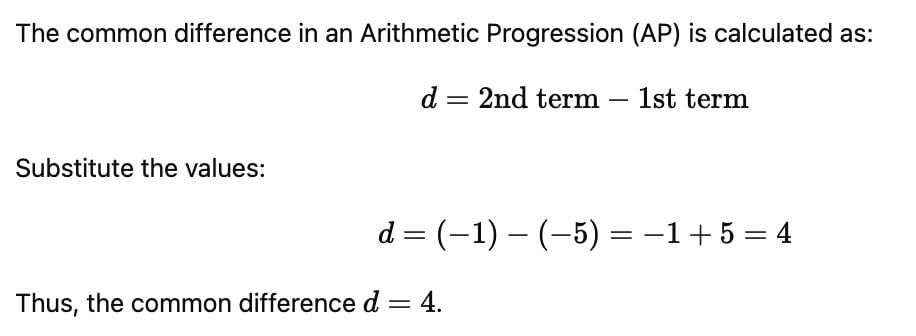Assertion & Reason Test: Arithmetic Progressions - Class 10 MCQ
10 Questions MCQ Test - Assertion & Reason Test: Arithmetic Progressions
Directions: In the following questions, A statement of Assertion (A) is followed by a statement of Reason (R). Mark the correct choice as.
Assertion (A): 184 is the 50th term of the sequence 3, 7, 11, …………
Reason (R): The nth term of A.P. is given by an = a + (n – 1)d
Directions: In the following questions, A statement of Assertion (A) is followed by a statement of Reason (R). Mark the correct choice as.
Assertion (A): Common difference of the A.P: -5,-1, 3, 7,……. is 4.
Reason (R): Common difference of the A.P. a, a + d, a + 2d, …….., is given by d = 2nd term – 1st term.
Directions: In the following questions, A statement of Assertion (A) is followed by a statement of Reason (R). Mark the correct choice as.
Assertion (A): Sum of first hundred even natural numbers divisible by 5 is 500.
Reason (R): Sum of first n terms of an A.P is given  l is last term
l is last term
Directions: In the following questions, A statement of Assertion (A) is followed by a statement of Reason (R). Mark the correct choice as.
Assertion (A): Sum of all 11 terms of an A.P whose middle most term is 30 is 330.
Reason (R): Sum of first n terms of an A.P is given by![]() l is the middle term
l is the middle term
Directions: In the following questions, A statement of Assertion (A) is followed by a statement of Reason (R). Mark the correct choice as.
Assertion (A): If the nth term of an A.P. is 7 – 4n, then its common differences is – 4.
Reason (R): Common differences of an A.P. is given by d = an + 1 – an
Directions: In the following questions, A statement of Assertion (A) is followed by a statement of Reason (R). Mark the correct choice as.
Assertion (A): If five times the fifth term of an A.P. is equal to eight times its eighth term, then its 13th term is zero.
Reason (R): Common difference of the A.P. a, a + d, a + 2d, …….., is given by d = 2nd term – 1st term.
Directions: In the following questions, A statement of Assertion (A) is followed by a statement of Reason (R). Mark the correct choice as.
Assertion (A): There will be 10 rows in the flower bed if there are 23 plants in the first row, 21 in the second row, 19 in the third and so on. Also 5 rose plants are in the last row.
Reason (R): Sum of first n terms of an A.P is given by ![]()
Directions: In the following questions, A statement of Assertion (A) is followed by a statement of Reason (R). Mark the correct choice as.
Assertion (A): The sum of first n terms of an A.P is given by Sn = 3n2 – 4n. Then its n term is given by the term an = 6n – 7.
Reason (R): nth term of an A.P, whose sum to n terms is Sn, is given by an = Sn – Sn – 1
DIRECTION : In the following questions, a statement of assertion (A) is followed by a statement of reason (R). Mark the correct choice as:
Assertion : Common difference of the AP -5, -1, 3, 7, .......... is 4.
Reason : Common difference of the AP a,ad +a , d+ 2 , .......... is given by d = 2 nd term-1st term.
DIRECTION : In the following questions, a statement of assertion (A) is followed by a statement of reason (R). Mark the correct choice as:
Assertion : an - an - 1 is not independent of n then the given sequence is an AP.
Reason : Common difference d =an - an - 1 is constant or independent of n .
















